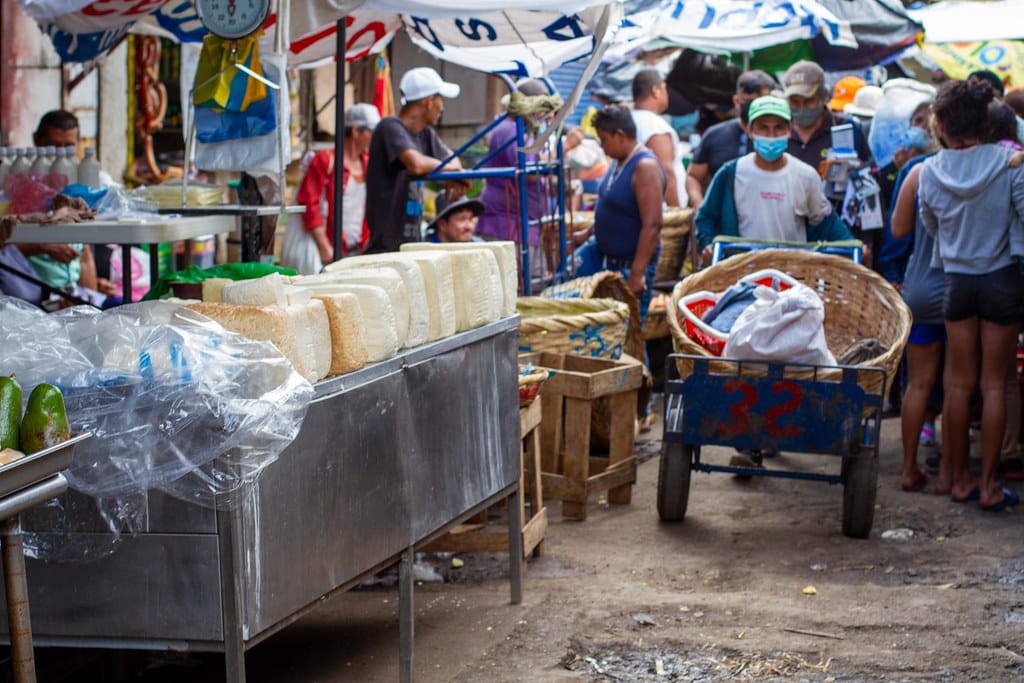María Potoy’s family spends 950 córdobas a month just to buy cheese. Not because it’s cheap, nor because it’s her favorite food, but simply because it’s a good option –instead of chicken or eggs– to feed the five children and three adults (including daughters and grandchildren) that make up her family nucleus.
But for more than a year, cheese in Nicaragua ceased to be a reasonable option for families, when its price exceeded the scales of what was hitherto known, to turn into a luxury what was once a popular accompaniment.
The reason why something that cost sixty córdobas in times of scarcity, would exceed the barrier of one hundred and ten córdobas in December 2022, according to official data from the Nicaraguan Institute of Development Information (Inide)has to do with the increase in international demand for that product, in conjunction with the fact that neither that industry nor the Government have reacted to increase production in line with that demand.
Data from the Export Procedures Center (Cetrex), show that in 2022, the country exported almost 660,000 additional kilos of dairy products, (0.94% more than in 2021), which generated additional income of 22.1 million dollars (10.94% more than the previous year). This is explained by a 9.9% increase in the average price of these exports.
In contrast, the milk production data from the Central Bank of Nicaragua, cut to October 2022, show a deficit of 12.9 million gallons of collected milk with respect to the same month of the previous year, which would have been enough to produce 5.8 million gallons. kilos of cheese, or 12.6 million pounds, or 126,400 quintals.
“That is part of the explanation, but it is not the whole”, assures the economist Julio Ricardo Hernández, recalling that “inputs have increased scandalously: At the end of 2021, a quintal of peanut flour cost 700 córdobas, and it rose to 2,600 at the end of 2022. Before the war in Ukraine, a quintal of urea cost 700 córdobasand 2,750 in December 2022. Both are key inputs for the moderately technical milkman,” he explained.
Hernández refers to the case of a rancher from a Leonese municipality who sells his product in Managua at an average price of 76 córdobas per pound, but the tenants resell it between 90 and 110, depending on the qualities. “If before, a merchant earned 2,000 córdobas selling 100 pounds a day, she wants to keep her 2,000 profit, even if she is selling only 80 pounds, so she increases her profit margin,” she explained.
Benjamín Hernández, a small producer from Matagalpa, believes that the high price of cheese is explained, in part, because milk is expensive: at this time they are paid 20 córdobas per liter, when the normal thing is that they are paid between 12 and 14 córdobas per liter . He assumes that if they are being paid better, it is “because everything has gone up. It is true that they are paying us better prices, but we are buying everything more expensive, ”he clarified.
“These data explain why milk and cheese have risen so much. The country is not only producing less, but it is also exporting more, and that significantly reduces domestic supply, while prices rise,” said the administrator of a company in the sector, who agreed to speak with CONFIDENTIALasking that his name be withheld.
Fewer and fewer beans with cheese
Going to the market to buy cheese is a task that requires patience, and a lot of it, to find the lowest possible price, as “Elena” knows very well, when she walks through the sections of the market asking how much the pound costs, and trying to negotiate the price to buy five pounds.
Thanks to his constant journey through the aisles of the “Iván Montenegro” market, he knows that a pound of cheese costs 95 córdobas, and 92 if he buys it wholesale, although he has found it at 100 and 98 córdobas, respectively.
When there is no time (or money) to go to the market, she, like many of her neighbors, goes to the grocery stores near her house, where they offer her half a pound for 50 or 52 córdobas, or four ounces for 25 córdobas, which it’s what most people who don’t have enough money to buy a pound buy.
In these cases, it is time to ration it so that the children have even a piece on their plate. The decision is to ration it, even if they manage to buy five pounds for the fortnight, thinking that they could also buy chicken, but it runs out in less time, while the price of a box of 30 eggs fluctuates between 130 and 140 córdobas.
To buy three pounds of beans, 105 cordobas are needed, and three pounds don’t last long in a house with so many mouths. Hence, it is difficult for any family head to understand why a pound of beans costs almost a dollar, in a country that produces almost 4.7 million quintals of beans per year.
“The answer is very simple: we have become a bean-exporting country, with El Salvador as its main destination. Salvadorans highly value Nicaraguan beans and cheese, and have greater purchasing power to pay for it,” explained the manager of a company specialized in agricultural production.
He observes that the growth of exports of both foods, without their production growing appropriately, generates overprices in the local market, and becomes the ‘cost of progress’. “As long as the country does not develop its export platform, we will see a deterioration in the trade balance, pressure on the value of the currency and devaluations, and there is no higher tax for the common citizen than loss of currency value”, he sentenced.
And if we produce more?
“International cheese prices are very good, and that is why it is being exported so much, at the expense of internal consumption, which raises its prices in a context in which the supply is insufficient to satisfy internal demand,” he reiterated to CONFIDENTIAL an economist who also asked not to be named.
Another element to understand is the difference between the purchasing power of the average Nicaraguan salary, with that of the destination markets, because that makes it more profitable to export than to sell in the domestic market.
“This is similar to what happened with beans, when their international price became very attractive, which led to increased exports that left domestic demand partially unprotected, with the result that the price rose. The government’s response, to cancel bean exports, created a liquidity problem for that union, ”he explained, urging them not to make such a decision again.
The current situation should generate new investments in the sector, which will lead to an increase in the production of meat and milk, and overcome the basic problem that the Nicaraguan livestock sector has, which is productivity, says the expert.
“The growth of exports served to give way to the ‘milk coup’, because livestock production improved, but not productivity. Milk production improves extensively, but yield per cow does not, so production costs remain just as high,” he detailed.
He explained that in this case, if the Government made the decision to paralyze cheese exports, it would aggravate this structural problem that shows the lack of appropriate economic policies, by the public sector in coordination with the private sector.
In reference to the decision to stop the exchange rate, said that this will reduce the profits of cheese exporters (of any exporter, in fact), “which could translate into a small discouragement to exports. This could be offset by an increase in domestic consumption of cheese, but this is conditioned by the purchasing power of wage earners”, he clarified.















